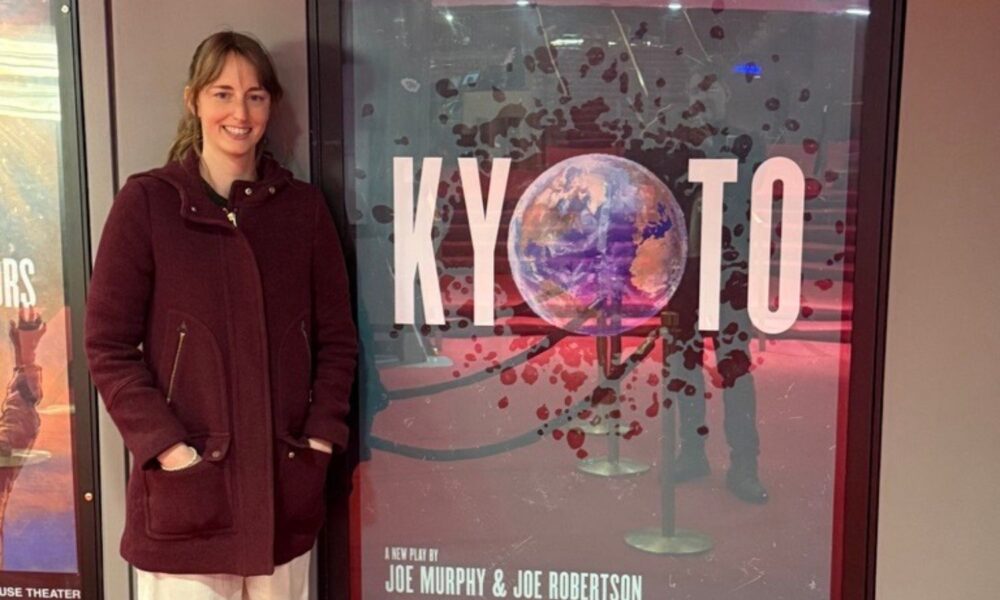This past weekend, I walked into Kyoto, the Royal Shakespeare Company production at the Lincoln Center in New York, curious to see how they would turn the long, tedious Intergovernmental Panel on Climate Change (IPCC) and UN Climate meetings (known as COPs) that I attend into entertaining theater. I must say, they did an incredible job. I walked out moved, unsettled, and profoundly grateful for the scientists and diplomats who refused to be intimidated into silence three decades ago.
Kyoto delivered a play about the past that reaches into the present, and a story about truth-tellers who dared to speak clearly in rooms where confusion, obfuscation, and stalling were rewarded. It is, somehow, both a riveting piece of theatre and a mirror held up to today’s climate politics.
An unexpected emotional punch
Kyoto tells the story of the lead-up to the adoption of the 1997 Kyoto Protocol through the eyes of Don Pearlman, a real-life fossil fuel lobbyist whose fingerprints can be found on nearly every major international effort to derail climate action in the 1990s. Pearlman narrates, maneuvers, manipulates, and obstructs his way through years of climate negotiations, secretly representing the interests of the fossil fuel industry.
As a scientist who has attended COPs and IPCC plenaries, I was struck by how achingly familiar the dynamics were. The procedural games. The strategic confusion. The late-night pressure. The way powerful countries hide behind claims of “uncertainty” long after the science is clear. The incessant use of delay as a weapon.
It was accurate in a way that made me laugh, wince, tear up, and shake my head all at once.
But what stayed with me most was the important story of industry interference and how the play captured the quiet, deeply human courage of the scientists and negotiators who made the Kyoto Protocol possible.
A legacy of disinformation
To understand why Kyoto feels so contemporary, you have to understand who Don Pearlman really was.
Pearlman wasn’t just an oil lobbyist. He was one of the most sophisticated architects of climate obstruction in the 1990s. He was a lawyer who embedded himself inside the UN climate negotiations with a goal to delay climate action for as long as possible to protect fossil fuel profits. This play, importantly, brought Don Pearlman’s nefarious actions into the light.
During his career, Pearlman worked closely with the Global Climate Coalition (GCC), a powerful fossil fuel industry group funded by companies like Exxon, Shell, BP, Texaco, and the American Petroleum Institute. The GCC’s mission was to undermine climate science and stop binding emissions cuts. Pearlman was their inside man. Pearlman pioneered several of the strategies that still define fossil fuel obstruction today including:
- Manufacturing scientific uncertainty, even when the evidence was overwhelming
- Pressuring government delegations to adopt weaker positions
- Splitting negotiating blocs by exploiting economic and political tensions
- Drafting alternative treaty language designed to confuse or derail consensus
- Working with Saudi Arabia and others to block any mention of fossil fuels in UN texts
- Weaponizing procedural tactics to run down the clock until decisions became impossible
There is a straight line from Pearlman’s strategy of obstruction to the disinformation fossil fuel companies continued to deploy long after the meeting in Kyoto. As our Decades of Deceit research shows, companies knew their products were dangerous as early as 1959, but for decades still worked to mislead the public about climate risks, funded front groups to attack climate science, promoted unproven technologies to delay regulation, cast doubt on the credibility of scientists, and obstructed action at COPs while marketing themselves as climate leaders.
Today, fossil fuel–aligned actors remain deeply embedded in the UN climate talks. COP30 had more than 1,600 registered fossil fuel lobbyists; one in every 25 participants at COP in Belém was associated with the industry. These fossil fuel and other industry lobbyists still work the halls of COP like Pearlman once did (only now in record numbers). You can feel his fingerprints in nearly every modern obstruction tactic. These behaviors are now so common in negotiations that we mapped them systematically in an obstruction typology.
It’s important to understand that Pearlman doesn’t simply represent the past, but he helped write the playbook that still defines the present. Understanding his legacy is essential for understanding why fossil fuel disinformation remains one of the biggest barriers to meaningful climate action today.
Ben Santer’s truth and the cost of telling it
Dr. Ben Santer’s role in the real Kyoto story is profound. His work was central to the 1995 IPCC Second Assessment Report, the first time the scientific community concluded that “the balance of evidence suggests a discernible human influence on global climate.” That sentence changed the world. It became the backbone for international action. It also made Ben a target.
When the fossil fuel industry started to lose based on the science it turned to personal attacks. Fossil fuel interests attacked him relentlessly. Politicians sought to discredit him. His scientific integrity and personal character were dragged through the mud. He endured years of harassment and threats simply because he did his job and refused to distort the evidence.
Watching Kyoto, I kept thinking about Ben. About his bravery. About how he holds the line when it is far easier (and far safer) not to. And about how many of the scientists I work with today are still facing versions of the same pressure.
What the play gets right about progress
One of the most striking themes in Kyoto is how fragile progress was. Consensus nearly failed at every moment. Countries threatened to walk out. Delegates fought over commas and percentage points. Sleepless negotiators disappeared from the room. And yet, somehow, the world left Kyoto with the first legally binding agreement to cut heat-trapping emissions. That didn’t happen because the process was flawless–far from it. In the end, the United States signed but failed to ratify the protocol, due in no small part to Don Pearlman. But Kyoto did happened in that moment because the science was undeniable, civil society pressure was relentless, small island states refused to be silenced, scientists like Ben Santer told the truth when it mattered most, and millions of people around the world were waking up to the reality of climate change.
The play shows this rising public awareness, but I wish it had shown more of the organizing, activism, and scientific persistence that made progress possible. The victories in Kyoto did not emerge from diplomatic perseverance alone, but from social and scientific forces that could not be suppressed. That lesson matters deeply today.
The tactics of obstruction continue at COP30
Neary thirty years after Kyoto, we are once again at a crossroads. The science is clearer than ever, yet in Belém at COP30, we watched an agreement get hollowed out in real time.
Despite a strong push from Brazil, Colombia, the EU, and dozens of other nations for a roadmap for a fair, funded, fast transition away from fossil fuel and a deforestation roadmap, the final outcome text contained no reference to phasing out fossil fuels and no binding plan on forests. A powerful bloc of major oil-producing states led by Saudi Arabia, Russia, and their allies, made it clear they were willing to collapse the talks rather than allow straightforward language on fossil fuels into the decision.
At the same time, wealthy countries once again pushed real finance off into the future. Adaptation finance targets were delayed to 2035. Commitments remained voluntary and aspirational, not binding. Countries on the frontlines of climate change left Belém with more text and more processes but not the public, grant-based resources they have long been promised.
Sitting in the theatre watching Kyoto, and thinking about the outcome in Belém, I kept thinking: this is Don Pearlman’s playbook in action.
How is climate obstruction still possible?
The main reason obstruction has been so effective for so long is that it has been allowed to operate in the shadows. Today, that is starting to change. Civil society, journalists, health leaders, youth, Indigenous organizers, trade unions, and researchers are naming these tactics for what they are. Our job right now is to drag this obstruction fully into the light: to show who is blocking progress, how they are doing it, and what it costs in human lives and lost opportunities. This is why I walked out of Kyoto feeling more resolved than ever to keep telling these stories until delay is no longer an option.
Why Kyoto left me hopeful
For all its darkness, Kyoto is ultimately a story about choices.
Don Pearlman chose obstruction.
Raul Estrada chose courage.
Scientists like Ben Santer chose truth.
In Kyoto, the world chose, however imperfectly, to take the first step.
The play reminded me of why I do this work: because the decisions made in these unseen rooms determine whether people live safely, whether communities thrive, and whether justice is possible.
It reminded me that the IPCC remains one of the most extraordinary scientific achievements of our time because thousands of scientists continue to show up despite political interference, despite attacks, despite pressure. I have been in those approval plenary rooms. I have watched governments try to water down language. I have watched scientists stand firm. I have watched the truth survive.
It reminded me that at COPs, despite the obstruction, there are always people—delegates, youth, Indigenous leaders, scientists, community advocates—who refuse to let fossil fuel interests write the story of the future.
It reminded me that even in the presence of overwhelming power, individuals matter.
Ben Santer matters.
Raul Estrada matters.
The negotiators from Kiribati and Tanzania matter.
And the scientists, lawyers, activists, and communities pushing for a fossil fuel phaseout today matter too.
The story of obstruction must be heard, and changed
Theatre can make people feel the real stakes. Kyoto does that with precision. It reminds us that the climate crisis is not an abstract policy debate. It is a human story, shaped by human choices, vulnerable to human failings, and lifted by human courage. It shows us that obstruction is not inevitable. It is engineered. And therefore, it can be dismantled. It shows us that progress, however small, however fragile, is built on the shoulders of people who choose to act despite fear, despite uncertainty, despite opposition.
Most of all, it shows us that we need more truth-tellers. More scientists willing to stand up, more experts willing to speak plainly, more leaders willing to push for a future free from fossil fuel harm. If Kyoto tells us anything, it’s that courage is contagious.

